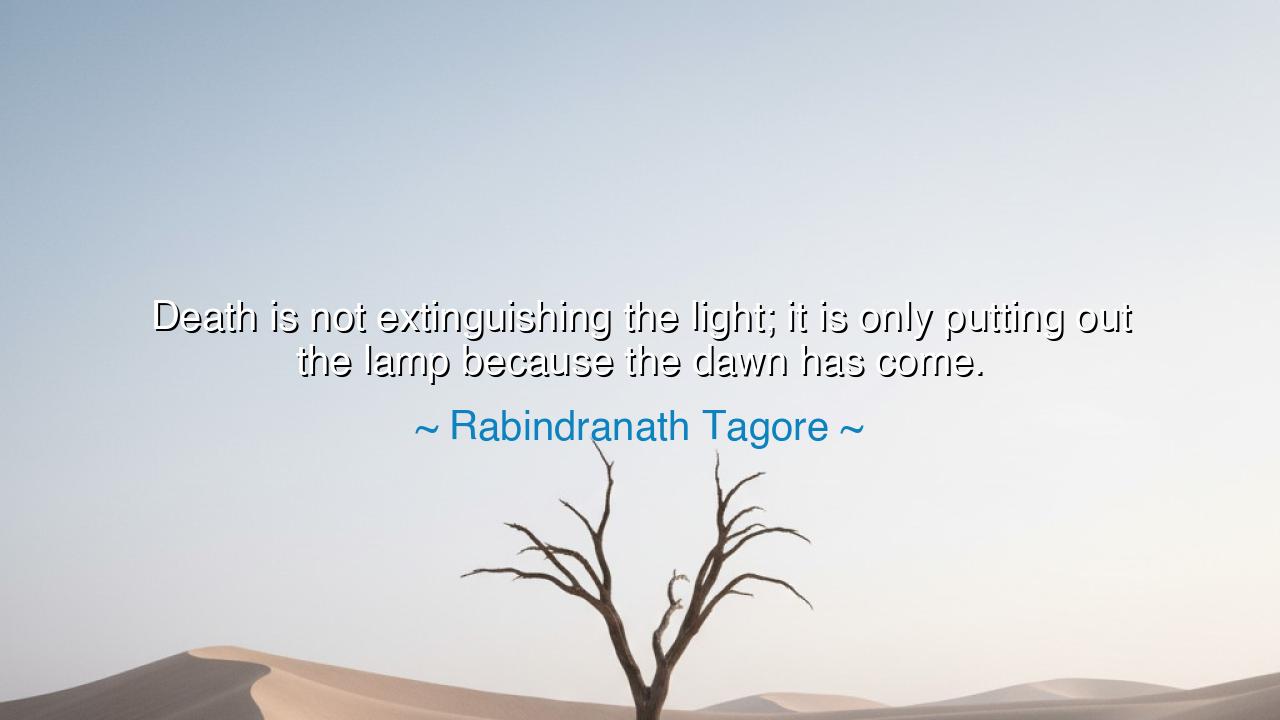
Death is not extinguishing the light; it is only putting out the
Death is not extinguishing the light; it is only putting out the lamp because the dawn has come.






The words of Rabindranath Tagore, “Death is not extinguishing the light; it is only putting out the lamp because the dawn has come,” are among the most beautiful meditations ever spoken on the nature of life and mortality. They rise from a spirit that has looked upon death not with fear, but with wonder — a spirit that sees beyond the darkness of endings to the quiet radiance of continuity. In these words, Tagore transforms death from a shadow into a revelation, from a loss into a passage. He reminds us that the soul’s journey does not conclude when the lamp goes out, for it is not the light that dies, but only the vessel that once bore it.
Tagore, the poet-saint of Bengal, wrote in an age of great turmoil — when his homeland was torn between colonial bondage and spiritual awakening. Yet, his vision was never bound to grief or despair. He saw all of existence as one continuous breath of the divine: life, death, and rebirth were but different rhythms of the same eternal music. The lamp in his metaphor represents the fragile vessel of human life — the body, the mind, the temporary form through which the light of the soul shines. When the dawn arrives — when the soul returns to its higher home — there is no longer need for the lamp. It is not a tragedy, but a fulfillment.
This image of the lamp and the dawn carries within it the wisdom of the ancients. The Upanishads, those timeless Indian scriptures, taught that the soul is eternal, that it merely passes from form to form as a traveler changes garments. Tagore, steeped in this tradition yet writing in the language of poets, gave this truth a gentleness that could touch any heart. His words whisper: do not weep when the flame goes out, for it has not died — it has simply merged with the greater light. Death, then, is not an ending but an awakening, a moment when the small lamp of the self rejoins the infinite brilliance of the divine dawn.
Consider the example of Mahatma Gandhi, who, upon his assassination, left his followers shattered in grief. Yet Gandhi himself had often spoken of death as a return, a liberation from duty. “My life is my message,” he said — meaning that the flame of his purpose would continue long after his body had fallen. When he died, the lamp went out, but the light did not fade; it spread across continents, igniting hearts with courage and nonviolence. Gandhi’s life was a living embodiment of Tagore’s truth: that when one’s dawn has come, the work of the lamp is done.
The deeper meaning of Tagore’s words also lies in the transformation of perception. To the fearful, death is the enemy — the destroyer of joy, the thief of love. But to the wise, death is but another face of life, a gateway rather than a wall. When the sun rises, we do not mourn the fading of the lamp; we rejoice that light has filled the world. So too, when a loved one passes, Tagore teaches us to see not the absence of their presence, but the vastness of their spirit — now free, now luminous, now everywhere. The dawn, in truth, is a homecoming.
Yet, this wisdom is not meant only for the hour of death; it is a lesson for the living. Every ending we endure — the loss of youth, the close of a chapter, the passing of time — carries within it the seed of a new beginning. The same rhythm that governs death governs change itself. When one dream ends, another begins to stir. When one season fades, another blooms. To live with Tagore’s vision is to see renewal in every loss, to understand that life’s light never vanishes — it only changes form.
So, my listener, take this teaching into your heart: do not fear the setting of the lamp. Whether it be in life, in love, or at the end of your days, trust that every darkness conceals a dawn waiting to be born. When you lose someone, honor their light by letting it live within you. When you face your own mortality, meet it not with dread, but with reverence — for you are not ending, you are returning. Learn, as Tagore did, to walk through the shadows with faith that the horizon burns with morning light.
And when that dawn comes — as it will for all — may you, too, lay down your lamp in peace, smiling as the eternal sun rises. For death is not extinguishing the light; it is the triumph of the light, spreading beyond the narrow flame of the self into the boundless radiance of eternity.






AAdministratorAdministrator
Welcome, honored guests. Please leave a comment, we will respond soon